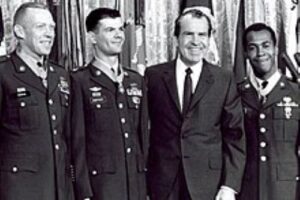Sgt First Class Fred William Zabitosky, US Army Vietnam
A high school dropout who reported had been in minor trouble several times as a teenager, Fred William Zabitosky not only loved the discipline of Army life but received the Medal of Honor for standing up for and saving his fellow Green Berets.
Born in October, 1942, Zabitosky was the son of Cora and Fred Theodore Zabitosky who lived on Perry Street in Trenton. His father, a barber operated his shop on Broad Street.
The family moved to Ewing Township around 1955 and rented a home on Oak Lane while his father operated his shop at 520 Ewing Road.
Not recognized as a good student and having encountered police and some time in reform school for petty theft, and a frequent runaway from his home environment, the 17-yeear old dropped out of school and joined the Army after his junior year. The family, which included four siblings moved once again this time to Ortley Beach.
Discipline and regulations of army life suited the young man who completed his basic training at Fort Benning, Georgia, the first time he had ever been out of the Garden State.
He went on to excel as a senior enlisted man in the newly formed Army Special Services, the Green Berets before serving his third tour in Vietnam.
Zabitosky was assigned to Military Assistance Command Vietnam’s Studies and Observations Group (MACV-SOG), Operations Project 35, the ‘Shining Brass’ code-named ‘Prairie Fire.’ The mission of his group was to conduct secret operations into Laos and Cambodia, an operation that had been ongoing for two years.
His specific mission was to infiltrate across the Laotian and Cambodian borders to monitor the Ho Chi Minh Trail.
Made the leader of Spike Team Maine, comprised of three Americans and nine indigenous troops, the team operated in unconventional warfare mode, wearing either North Vietnamese clothes or generic military fatigues without any identification and carrying Russian AK-47 rifles or Swedish K-sub-machine guns.
His Medal of Honor citation tells the story in accurate and brief detail, but Zabitosky took over leadership in his first combat assignment and led his team from their helicopters through bamboo thickets where they encountered the North Vietnam enemy, and were suddenly engaged in battle.
Suffering a broken shoulder, ribs and back himself, Zabitosky managed to rescue the co-pilot of the helicopter along with another pilot as well. He was later hospitalized for six weeks before going back continuing serving in the active duty army.
The Medal of Honor recipient was present in March 1969 to receive the Medal of Honor for the 1967 mission from President Ricard M Nixon at the White House. In accepting the Medal, the soldier said that while he was the one wearing it, it was earned by the team members and all the Special Forces enlisted men who served on special projects.
Zabitosky remained 30 years in military service, married and had a son Edward who predeceased him. He retired in 1989 as a sergeant major and continued to serve the military working for the Veterans Administration at Fort Bragg and remaining active in efforts to recover MIA/POWs.
Zabitosky died of cancer Jan. 8, 1996 as a Master Sergeant at the age of 53, cancer most likely caused by exposure to Agent Orange during his time in the jungles of Vietnam, Laos and Cambodia.
His wife Carrie Mae died in 2007. He is buried in Lumbee Memorial Gardens, Lumberton, Robeson County, North Carolina. The main thoroughfare at the Special Warfare School at Fort Bragg, home of the Green Berets, is named in his honor.
His Medal of Honor citation reads:
For conspicuous gallantry and intrepidity in action at the risk of his life above and beyond the call of duty. Sfc. Zabitosky, U.S. Army, distinguished himself while serving as an assistant team leader of a nine-man Special Forces long-range reconnaissance patrol.
Sfc. Zabitosky’s patrol was operating deep within enemy controlled territory in Laos when they were attacked by a numerically superior North Vietnamese Army unit.
Sfc. Zabitosky rallied his team members, deployed them into defensive positions, and, exposing himself to concentrated enemy automatic weapons fire, directed their return fire.
Realizing the gravity of the situation, Sfc. Zabitosky ordered his patrol to move to a landing zone for helicopter extraction while he covered their withdrawal with rifle fire and grenades.
Rejoining the patrol under increasing enemy pressure, he positioned each man in a tight perimeter defense and continually moved from man to man, encouraging them and controlling their defensive fire.
Mainly due to his example, the outnumbered patrol maintained its precarious position until the arrival of tactical air support and a helicopter extraction team.
As the rescue helicopters arrived, the determined North Vietnamese pressed their attack.
Sfc. Zabitosky repeatedly exposed himself to their fire to adjust suppressive helicopter-gunship fire around the landing zone.
After boarding one of the rescue helicopters, he positioned himself in the door delivering fire on the enemy as the ship took off. The helicopter was engulfed in a hail of bullets and Sfc. Zabitosky was thrown from the craft as it spun out of control and crashed.
Recovering consciousness, he ignored his extremely painful injuries and moved to the flaming wreckage. Heedless of the danger of exploding ordnance and fuel, he pulled the severely wounded pilot from the searing blaze and made repeated attempts to rescue his patrol members but was driven back by the intense heat. Despite his serious burns and crushed ribs, he carried and dragged the unconscious pilot through a curtain of enemy fire to within 10 feet of a hovering rescue helicopter before collapsing.
Sfc. Zabitosky’s extraordinary heroism and devotion to duty were in keeping with the highest traditions of the military service and reflect great credit upon himself, his unit, and the U.S. Army.
For more New Jersey Medal of Honor Recipients, click HERE
